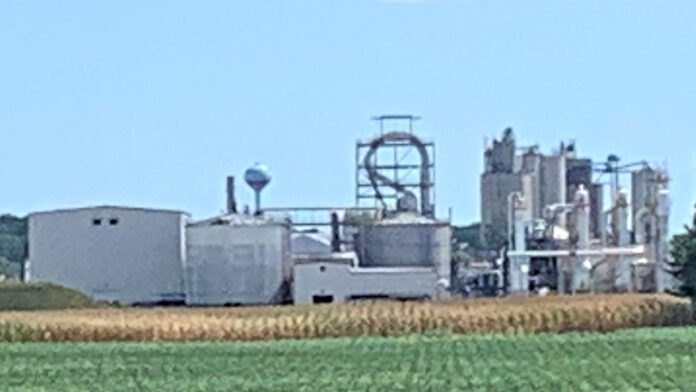
Income for Iowa farmers might decline $1.1 billion per year if the state’s ethanol plants are unable to capture and sequester their carbon dioxide with the help of proposed pipelines to transport it, according to a study commissioned by the Iowa Renewable Fuels Association.
The study — by Decision Innovation Solutions of Urbandale — predicts that three-quarters of ethanol production in Iowa would leave the state without the pipelines and that farmers could see a reduction in the prices they get for their corn of up to 75 cents per bushel.
“The wealth that’s been generated in today’s agriculture is mostly due to the ethanol plants that have been built,” said Tim Recker, a northeast Iowa farmer, in a press call to discuss the study’s findings.
The association, which advocates for policies that benefit the ethanol industry, is releasing results of the study amid three pipeline proposals from companies that want to transport captured carbon dioxide from Iowa ethanol plants out of state for underground sequestration and other commercial uses. One proposal, from Wolf Carbon Solutions, would bring a CO2 pipeline through parts of Eastern Iowa, including the southern portion of Linn County.
All three projects are threatened by pending legislation in the Iowa House that would impose new restrictions on them that would affect the companies’ ability to use eminent domain to force land easements and would allow counties to dictate where they can’t be built, among other provisions.
“I hope that it does not become law the way it is because it will kill these projects and have a very scarily large detrimental impact on our industry,” said Monte Shaw, the association’s executive director.
The bill’s primary sponsor is optimistic it will get a vote in the House, but the outcome of that vote and the bill’s future in the Iowa Senate appears dim. There is a proposed amendment in the House that would strip the restrictions but give landowners better opportunities to recoup damages from pipeline construction.
About one-third of the ethanol plants that Summit Carbon Solutions wants to connect to its multi-state pipeline are in Iowa, and they account for most of Navigator CO2 Ventures’ project.
It’s unclear how those companies might adjust their projects if Iowa is off limits, but David Miller, an economist for the company that conducted the study, is confident that pipelines will be built in other states, with or without Iowa.
“The monetary incentives for doing carbon capture via pipeline are very dramatic,” Miller said. “And so you will see them, I think, be built up along the eastern side of Nebraska. You’re gonna see them in South Dakota. You’re gonna see them across southern Minnesota. I think you would see them go into Wisconsin.”
There are federal tax incentives that reward ethanol plants for capturing their carbon dioxide and for producing fuels in a way that reduces the amount of the greenhouse gas that is emitted into the atmosphere.
Miller has said those incentives have the potential to more than triple the profit margins of ethanol plants.
The ethanol industry is a major market for farmers — more than half of Iowa corn is used to produce the fuel. If ethanol production shifts to other states, farmers will get less money for their corn from Iowa buyers and, if they sell to buyers farther away, will incur additional expenses for transportation.
It’s unclear when the House might vote on the pipeline bill. Summit is the furthest along in obtaining a hazardous liquid pipeline permit for its project and has a final, multi-week hearing with the Iowa Utilities Board set to start in October.
This article was originally published by the Iowa Capital Dispatch. Reprinted with permission.




